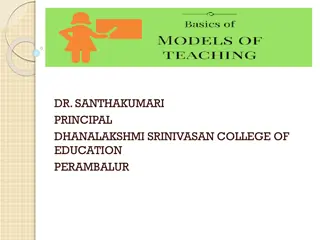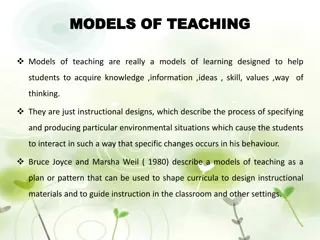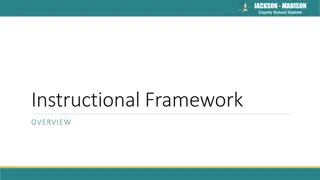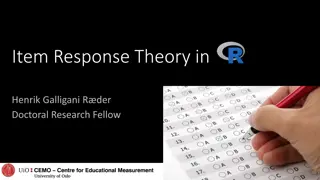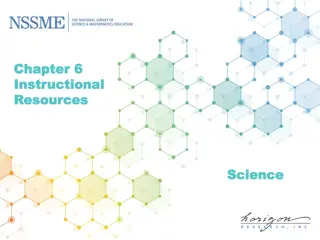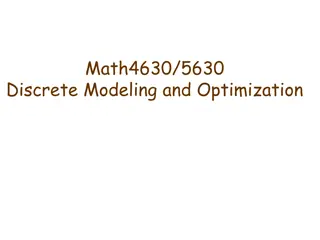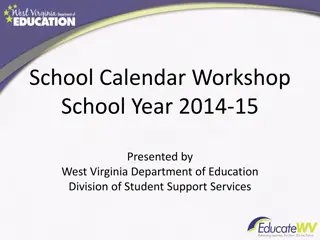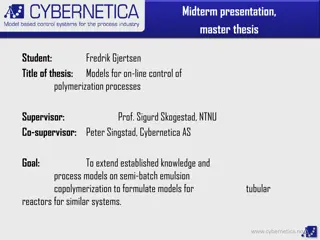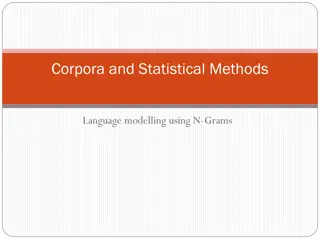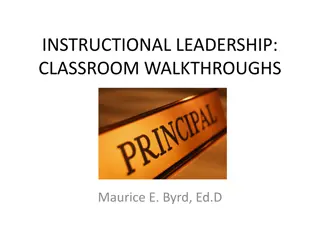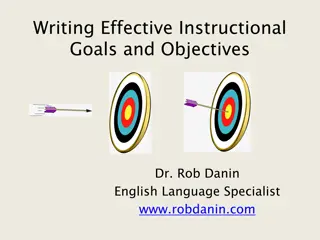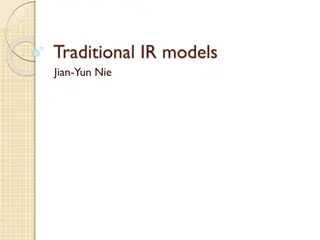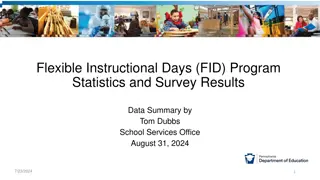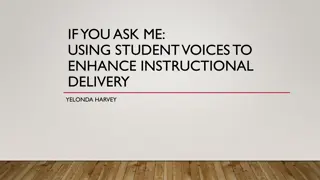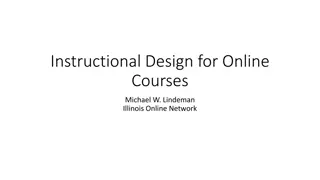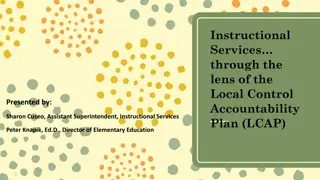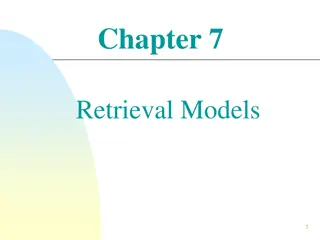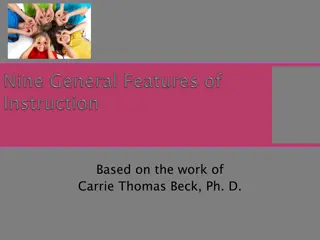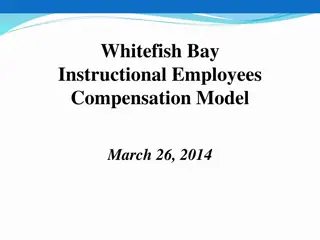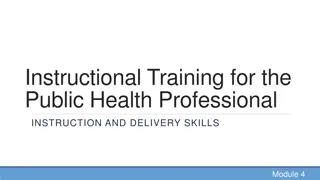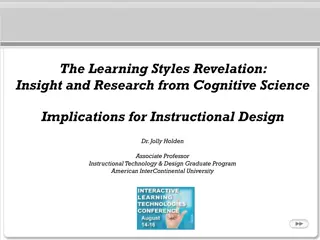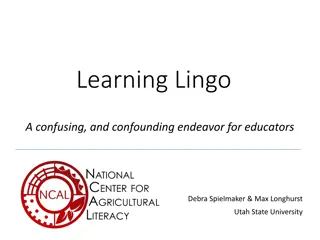Global Climate Models
Scientists simulate the climate system and project future scenarios by observing, measuring, and applying knowledge to computer models. These models represent Earth's surface and atmosphere using mathematical equations, which are converted to computer code. Supercomputers solve these equations to pr
3 views • 15 slides
Exploring Shared Instructional Leadership in Danish Schools
This study delves into how principals implement shared instructional leadership in Danish primary and lower secondary public schools, aiming to enhance dialogue on its potential in diverse cultural contexts. The Danish educational landscape, emphasizing autonomy and democratic participation, poses c
1 views • 14 slides
Academic Progress Monitoring for Effective Instructional Planning
Academic progress monitoring involves measuring student performance to evaluate responsiveness to interventions, guide instructional decisions, and determine when adjustments are necessary. It helps identify students needing additional support, compare instructional effectiveness, decide on changes,
2 views • 44 slides
System Models in Software Engineering: A Comprehensive Overview
System models play a crucial role in software engineering, aiding in understanding system functionality and communicating with customers. They include context models, behavioural models, data models, object models, and more, each offering unique perspectives on the system. Different types of system
3 views • 33 slides
Behavior Progress Monitoring for Individualized Instructional Planning
Utilizing behavior progress monitoring allows educators to track student performance over time, make data-informed decisions to improve responsiveness to interventions, and tailor instructional plans for individual students. This comprehensive approach involves steps such as setting the stage, analy
6 views • 52 slides
Understanding Input-Output Models in Economics
Input-Output models, pioneered by Wassily Leontief, depict inter-industry relationships within an economy. These models analyze the dependencies between different sectors and have been utilized for studying agricultural production distribution, economic development planning, and impact analysis of i
8 views • 7 slides
Understanding Models of Teaching in Education
Exploring different models of teaching, such as Carroll's model, Proctor's model, and others, that guide educational activities and environments. These models specify learning outcomes, environmental conditions, performance criteria, and more to shape effective teaching practices. Functions of teach
2 views • 20 slides
Understanding Models of Teaching for Effective Learning
Models of teaching serve as instructional designs to facilitate students in acquiring knowledge, skills, and values by creating specific learning environments. Bruce Joyce and Marsha Weil classified teaching models into four families: Information Processing Models, Personal Models, Social Interactio
1 views • 28 slides
Jackson-Madison County School System Instructional Framework Overview
In the Jackson-Madison County School System, the focus is on a research-based instructional framework consisting of curriculum, lesson structures, and authentic literacy. Emphasizing the importance of a content-rich curriculum, effective teaching practices, and purposeful literacy, the district aims
0 views • 37 slides
Significance of Models in Agricultural Geography
Models play a crucial role in various disciplines, including agricultural geography, by offering a simplified and hypothetical representation of complex phenomena. When used correctly, models help in understanding reality and empirical investigations, but misuse can lead to dangerous outcomes. Longm
0 views • 8 slides
Understanding CGE and DSGE Models: A Comparative Analysis
Explore the similarities between Computable General Equilibrium (CGE) models and Dynamic Stochastic General Equilibrium (DSGE) models, their equilibrium concepts, and the use of descriptive equilibria in empirical modeling. Learn how CGE and DSGE models simulate the operation of commodity and factor
4 views • 15 slides
Enhancing Information Retrieval with Augmented Generation Models
Augmented generation models, such as REALM and RAG, integrate retrieval and generation tasks to improve information retrieval processes. These models leverage background knowledge and language models to enhance recall and candidate generation. REALM focuses on concatenation and retrieval operations,
1 views • 9 slides
Understanding Item Response Theory in Measurement Models
Item Response Theory (IRT) is a statistical measurement model used to describe the relationship between responses on a given item and the underlying trait being measured. It allows for indirectly measuring unobservable variables using indicators and provides advantages such as independent ability es
2 views • 32 slides
Science Instructional Resources Usage in Elementary and Middle School Classes
Explore the utilization of instructional resources in science classes across elementary and middle schools. The data showcases the distribution of various types of resources such as textbooks, kits/modules, online units, and more designated for educational purposes. Discover the percentage breakdown
0 views • 52 slides
Understanding Discrete Optimization in Mathematical Modeling
Discrete Optimization is a field of applied mathematics that uses techniques from combinatorics, graph theory, linear programming, and algorithms to solve optimization problems over discrete structures. This involves creating mathematical models, defining objective functions, decision variables, and
0 views • 12 slides
Observational Constraints on Viable f(R) Gravity Models Analysis
Investigating f(R) gravity models by extending the Einstein-Hilbert action with an arbitrary function f(R). Conditions for viable models include positive gravitational constants, stable cosmological perturbations, asymptotic behavior towards the ΛCDM model, stability of late-time de Sitter point, a
1 views • 12 slides
Legislative Changes in School Calendar Policies
Significant legislative revisions were made to school calendar statutes in West Virginia during the 2013 legislative session, allowing more flexibility for county boards to develop calendars while ensuring a minimum of 180 instructional days. The changes mandated public hearings, set guidelines for
1 views • 63 slides
Understanding Wireless Propagation Models: Challenges and Applications
Wireless propagation models play a crucial role in characterizing the wireless channel and understanding how signals are affected by environmental conditions. This article explores the different propagation mechanisms like reflection, diffraction, and scattering, along with the challenges and applic
1 views • 14 slides
Models for On-line Control of Polymerization Processes: A Thesis Presentation
This presentation delves into developing models for on-line control of polymerization processes, focusing on reactors for similar systems. The work aims to extend existing knowledge on semi-batch emulsion copolymerization models, with a goal of formulating models for tubular reactors. Strategies, ba
0 views • 16 slides
Understanding N-Gram Models in Language Modelling
N-gram models play a crucial role in language modelling by predicting the next word in a sequence based on the probability of previous words. This technology is used in various applications such as word prediction, speech recognition, and spelling correction. By analyzing history and probabilities,
0 views • 101 slides
Enhancing Instructional Leadership Through Classroom Walkthroughs
Effective instructional leadership in schools involves principals taking on roles as instructional leaders through classroom walkthroughs. These walkthroughs help assess teaching strategies, student engagement, and classroom practices, leading to improved learning outcomes. By focusing on key compon
0 views • 7 slides
Writing Effective Instructional Goals and Objectives in Education
Determine the importance of setting clear instructional goals and objectives for effective lesson planning in education. Explore the difference between goals and objectives, understand how to write instructional goals, and learn to create specific, measurable instructional objectives for student ach
0 views • 12 slides
Understanding Information Retrieval Models and Processes
Delve into the world of information retrieval models with a focus on traditional approaches, main processes like indexing and retrieval, cases of one-term and multi-term queries, and the evolution of IR models from boolean to probabilistic and vector space models. Explore the concept of IR models, r
0 views • 65 slides
Flexible Instructional Days (FID) Program Overview
The Flexible Instructional Days (FID) Program allows schools to provide remote instruction on days when traditional delivery is not feasible. Schools must apply to the Pennsylvania Department of Education (PDE) to participate in the program, which requires approval by the entity's governing body. FI
0 views • 25 slides
Enhancing Instructional Delivery Through Student Voices: A Study by Yelonda Harvey
Yelonda Harvey conducted a study at a Title I school in Ward 7 to investigate the impact of different instructional strategies on students' academic progress. The research involved administering questionnaires to fifth-grade science students, focusing on student preferences for various teaching moda
0 views • 16 slides
Understanding Cross-Classified Models in Multilevel Modelling
Cross-classified models in multilevel modelling involve non-hierarchical data structures where entities are classified within multiple categories. These models extend traditional nested multilevel models by accounting for complex relationships among data levels. Professor William Browne from the Uni
0 views • 13 slides
Understanding General Equilibrium Models and Social Accounting Matrices
General Equilibrium Models (CGE) and Social Accounting Matrices (SAM) provide a comprehensive framework for analyzing economies and policies. This analysis delves into how CGE models help simulate various economic scenarios and their link to SAM, which serves as a key data input for the models. The
0 views • 50 slides
Effective Strategies for Online Course Development
Instructional Design for Online Courses by Michael W. Lindeman presents valuable insights into the systematic process of translating learning principles into instructional materials. It covers differences between face-to-face and online course planning, considerations for online course development,
0 views • 27 slides
Overview of Instructional Services through LCAP
Explore how Instructional Services, including Elementary Education, Special Education, Child Development, Instructional Technology, Arts & Career Technical Education, and Induction programs, are structured and evaluated within the context of the Local Control Accountability Plan (LCAP). The organiza
0 views • 38 slides
Understanding Retrieval Models in Information Retrieval
Retrieval models play a crucial role in defining the search process, with various assumptions and ranking algorithms. Relevance, a complex concept, is central to these models, though subject to disagreement. An overview of different retrieval models like Boolean, Vector Space, and Probabilistic Mode
0 views • 56 slides
Reconsidering the Matching of Texts to Students' Reading Levels
The prevailing belief that instructional materials should be tailored to students' reading levels to enhance learning may not be as effective as commonly thought. Contrary to this idea, evidence suggests that such text placements can hinder rather than facilitate student reading achievement. The his
0 views • 45 slides
Effective Instructional Strategies for Engaging Students
Instructional tasks are modeled appropriately, explicit instruction is provided, and students are engaged in meaningful interactions. Opportunities for practice and corrective feedback are given, while encouraging student effort and success. Demonstrations and step-by-step guidance help students lea
0 views • 58 slides
Understanding Compensation Models for Instructional Employees
Exploring the Whitefish Bay Instructional Employees Compensation Model and its evolution, including changes in salary determination, state budget impacts, and prior compensation adjustments. Discussions on the significance of teacher compensation changes, elements of compensation beyond salary, and
0 views • 27 slides
Instructional Training for Public Health Professionals Module 4
This module focuses on enhancing instructional and delivery skills for public health professionals. Participants will learn to identify factors for effective delivery, recognize positive presentation skills, and describe tools used in instructional settings. Topics covered include instructor aptitud
0 views • 23 slides
Learning Styles and Instructional Design: Debunking Misconceptions
The concept of learning styles as predictors of learning outcomes is widely misunderstood. Research shows little impact on learning outcomes. This presentation explores the implications for instructional design and questions the relevance of considering learning styles as a variable in instructional
0 views • 56 slides
Jackson-Madison County School System Instructional Framework Overview
The Jackson-Madison County School System focuses on engagement through a research-based instructional framework centered on curriculum, lesson structures, and authentic literacy. Emphasizing the importance of a content-rich curriculum and effective teaching practices, the district aims to improve in
0 views • 26 slides
Understanding Composite Models in Building Complex Systems
Composite models are essential in representing complex entities by combining different types of models, such as resource allocation, transport, and assembly models. Gluing these models together allows for a comprehensive representation of systems like the milk industry, where raw materials are trans
0 views • 27 slides
Comprehensive Analysis of Instructional Model and Engagement in a Lesson
This analysis examines the instructional models exhibited by a teacher during a lesson, focusing on engagement and strengths. Recommendations for potential improvements are also discussed. The content includes images and discussions on identifying instructional models, strengths of the lesson, and r
0 views • 6 slides
Understanding Learning Lingo: Curriculum and Models in Education
The content delves into the complexities of learning lingo, exploring terms such as learning theory, curriculum theory, instructional models, strategies, and methods in education. It covers various instructional models like Understanding by Design and Universal Design for Learning, providing insight
0 views • 13 slides
Understanding the Effectiveness of Instructional Games and Simulations
This research delves into the use of Analysis of Patterns in Time (APT) to measure interactions in instructional games, comparing it with Linear Models Approach (LMA). Findings show that students are more engaged during interactive instruction. The significance lies in APT measuring relations while
0 views • 22 slides






